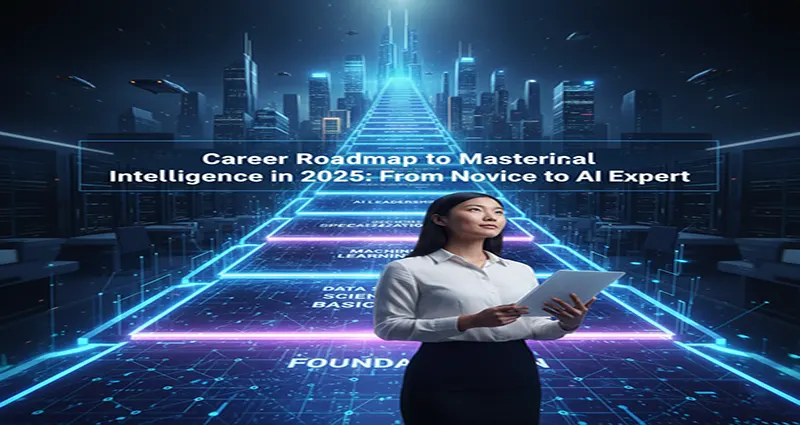The Artificial Intelligence (AI) landscape is rapidly evolving, driven by the emergence of Generative AI, Agentic AI, and Multimodal AI. As AI fluency becomes a core skill across industries, mastering this field in 2025 offers substantial career growth and a premium on wages. This roadmap provides a structured path for aspiring AI professionals.
Stage 1: Build a Strong Foundation (The Core)
Before diving into complex models, establish a solid technical base. This stage is non-negotiable for long-term mastery.
| o | Programming Excellence (Python is Key): | |
| » | Master Python, the most widely used language in AI, focusing on data structures, basic algorithms, and object-oriented programming. | |
| » | Become proficient with core AI libraries like NumPy (for numerical operations) and Pandas (for data manipulation and analysis). | |
| o | Mathematical and Statistical Fundamentals: | |
| » | A strong grasp of Linear Algebra (vectors, matrices, and their operations) is essential for understanding how most algorithms work. | |
| » | Solid knowledge of Probability and Statistics is required for data analysis, model evaluation, and handling uncertainty. | |
| » | Understand Calculus (especially derivatives and gradients) as it underpins model optimization techniques like gradient descent. | |
| o | Core Data Science: | |
| » | Learn Data Cleaning and Preparation, as high-quality data is the lifeblood of AI. | |
| » | Master Exploratory Data Analysis (EDA) and data visualization to extract meaningful insights. |
Stage 2: Master Machine Learning & Deep Learning
This stage introduces the fundamental AI methodologies.
| o | Machine Learning (ML) Mastery: | |
| » | Understand the three main learning paradigms: Supervised, Unsupervised, and Reinforcement Learning. | |
| » | Learn to implement and evaluate classical ML algorithms, such as Linear Regression, Decision Trees, Random Forests, and Support Vector Machines. | |
| o | Deep Learning & Neural Networks: | |
| » | Dive into Deep Learning, the advanced subset of ML that uses multi-layered neural networks. | |
| » | Gain hands-on experience with frameworks like PyTorch or TensorFlow/Keras. | |
| » | Study different neural network architectures like Convolutional Neural Networks (CNNs) for image tasks and Recurrent Neural Networks (RNNs) / Transformers for sequence data. |
Stage 3: Specialization and Cutting-Edge Skills (2025 Focus)
The current AI boom is characterized by specific technologies that demand specialized skills. Choose a specialization and go deep.
| Specialization Area | Key Concepts/Technologies to Master | In-Demand Roles |
| Generative AI & LLMs | Prompt Engineering, Large Language Models (LLMs), Fine-tuning LLMs for specific tasks, Retrieval-Augmented Generation (RAG), Diffusion Models (for image/video). | Generative AI Engineer, Prompt Engineer, AI Product Developer. |
| AI Agent | AI Agent Fundamentals, Reasoning Algorithms, Agent Frameworks (e.g., LangChain), Multi-Agent Systems, Tool Use/Function Calling. | AI Architect, Agent Developer. |
| Computer Vision (CV) | Object Detection (e.g., YOLO), Semantic Segmentation, Real-time inference, frameworks like OpenCV and image annotation tools. | Computer Vision Engineer. |
| Natural Language Processing (NLP) | Transformers (BERT, GPT), Tokenization, Sentiment Analysis, Named Entity Recognition (NER), and building sophisticated language applications. | NLP Engineer. |
Stage 4: Transition to Production and Ethical AI
To be a valuable professional, your models must move from an experimental notebook into a scalable, responsible system.
| o | MLOps (Machine Learning Operations): | |
| » | Learn the best practices for deploying, monitoring, and maintaining AI models in production environments. | |
| » | Master concepts like Model Versioning, CI/CD (Continuous Integration/Continuous Deployment) for AI, and using tools like Docker and Kubernetes. | |
| o | Ethical AI and Responsible Implementation: | |
| » | As AI systems become autonomous, AI Ethics is paramount. Learn to identify and mitigate Bias and Fairness issues in data and models. | |
| » | Focus on Transparency and Accountability in AI decision-making. |
Continuous Growth: The Expert Mindset
AI is a field of constant change. Mastering it is a continuous journey.
| o | Hands-on Project Portfolio: The single most important factor for hiring is a strong portfolio. Apply your skills to real-world problems. Participate in competitions on platforms like Kaggle and contribute to open-source AI projects. |
| o | Stay Updated: Regularly read cutting-edge research papers (e.g., from arXiv), follow top AI conferences, and engage with online AI communities. |
The roadmap culminates in highly sought-after roles like AI/ML Engineer, Data Scientist (AI Focus), AI Researcher, or specialized roles like Generative AI Engineer. Your success in 2025 will be defined by your adaptability, specialization in current trends, and the ability to deploy robust, ethical AI solutions.










